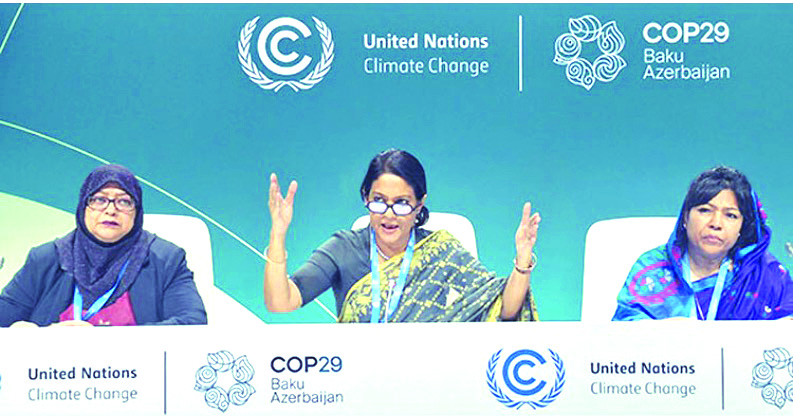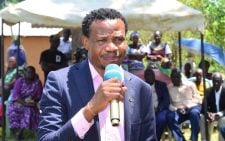Africa kicks as climate finance deal falls short of expectations

As the United Nations Climate Change Conference (COP29) enters its last leg today, negotiators are working round the clock to reach agreement on a number of key issues on the eight items on the agenda.
Hints were given that some consensus would be reached on the big one – climate finance – with the world’s leading economies under the G20 group sending strong yet fragile signals of support for the New Collective Quantified Goal (NCQG).
The NCQG on climate finance is a new goal that aims to provide the funds needed to help developing countries like Kenya adapt to climate change and transition to low-carbon economies.
The goal was decided in 2015 at the UN Framework Convention on Climate Change (UNFCCC) COP21 in Paris and has been a thorny focus of negotiations at COP29.
Methane emissions
Great news of the day came when countries representing nearly 50 percent of the global methane emissions from organic waste endorsed the COP29 declaration on reducing methane from organic waste.
Methane (CH4) is a powerful heat-trapping gas. An estimated 60 percent of today’s emissions are the result of human activities. Methane is a powerful greenhouse gas (GHG), and is the second largest contributor to climate warming after carbon dioxide (CO2).
According to scientists, a molecule of methane traps more heat than a molecule of CO2, but methane has a relatively short lifespan of 7 to 12 years in the atmosphere, while CO2 can persist for hundreds of years or more.
Human activities
Methane comes from both natural sources and human activities. An estimated 60 per cent of today’s methane emissions are the result of human activities. The largest sources of methane are agriculture, fossil fuels, and decomposition of landfill waste.
Natural processes account for 40 percent of methane emissions, with wetlands being the largest natural source.
The concentration of methane in the atmosphere has more than doubled over the past 200 years. Scientists estimate that this increase is responsible for 20 to 30 percent of climate warming since the Industrial Revolution (which began in 1750).
Nations’ COP29 declaration on reducing methane from organic waste coinciding with the Food, Water and Agriculture Day at the climate talks was timely since food waste is a significant source of methane emissions.
The US Environmental Protection Agency notes that out of all methane emissions from landfills, a whopping 58 per cent is attributable to wasted food.
“This understanding that fighting the climate crisis and fighting food waste go hand-in-hand must extend into our own communities after COP29 ends,” said Danielle Nierenberg, a world-renowned researcher on food systems and agriculture. “We need action on the city level especially – municipal governments need to adopt food waste strategies that highlight circular food systems and encourage behavioural change among consumers. Successful food-waste prevention comes from commonly-driven solutions!”
Other good news from COP29 came for food security and the transformation of agricultural food systems Nierenberg says the newly Baku Harmoniya Climate Initiative for farmers launched in collaboration with the Food and Agriculture Organization (FAO) is a step in the right direction.
The initiative will help improve coordination among existing coalitions, encourage investments, and empower all formers, especially women and young folks. Dominica Minister for Agriculture, Fisheries, and Blue and Green Economy, summed up the developing nations call to action: “First, we need to commit to the pledges that are made at COP29. As a small economy, my nation faces the brunt. Second, let’s place more emphasis on youth in agriculture.”
Turning the pledges so far made in Baku into legally binding agreements hat ensure accountability and real impact are the next step as the tough negotiations at COP29 hurtle towards the conclusion of the world’s premier climate event.
As the negotiations in Baku ground to the conclusion of the world’s major annual climate event finance and nationally determined contributions (NDCs) remained the main topics of COP29.
UNFCCC Executive Secretary Simon Stiell, delivering a speech on the next rounds of NDCs termed them “the most important policy documents of this century.”
The African Development Bank (AfDB) Vice President Kevin Kariuki and Climate and Environment Finance Manager Gareth Philips highlighted the urgent need for increased climate finance and stronger partnerships as they outlined Africa’s significant financing gap:
“The African Economic Outlook projects a financing requirement of approximately $2.7 trillion by 2030 – equivalent to $400 billion annually – to effectively combat climate change,” Philips stated. “Yet Africa received just $47 billion in 2022, accounting for only 3.6 per cent of global climate finance.







